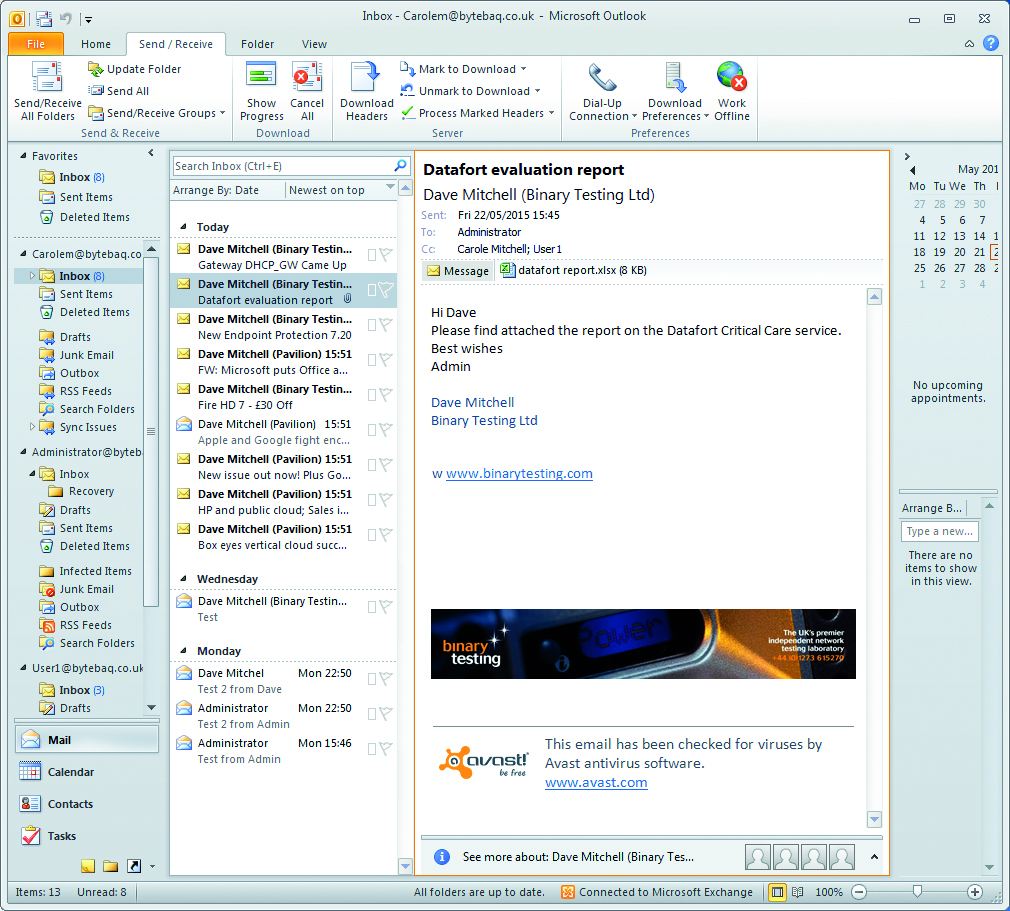DataFort Critical Care review
This managed backup service takes care of everything, giving you data security without the stress

Critical Care offloads the job of backing up an organisation's important data with seamless recovery processes. Costs are based on system usage rather than capacity, which makes it more affordable.
-
+
Pricing based on number of servers; On-site appliance managed and monitored remotely; Off-site data replication
-
-
24-hour support could cost extra

If you're short on time, short on staff and lacking in technical expertise, DataFort's Critical Care service may be just the thing your business needs. The company provides on-site and off-site protection, with disaster recovery for key systems, and the real clincher is that DataFort looks after every aspect of it for you.
The Critical Care pricing structure is based on the number of servers to be protected, rather than the amount of data being secured. This means you don't have to worry about getting the right-sized appliance upfront, and you can keep to a predictable budget no matter how your data-storage needs grow. Prices start at 350 per month for the first server, and 300 for each extra system. DataFort also offers a granular email recovery service for Microsoft Exchange, which costs an additional 50 per data store per month.
As mentioned above, the basic price also includes disaster-recovery invocation. So if you can't get into your office perhaps due to a flood, a fire or the like DataFort can fire up cloud-based VMs of your protected systems, so you can carry on working from another location using the supplied VPN router. In case of hardware failure, DataFort can also image a replacement server for you.
Getting set up was as easy as picking up the phone to call DataFort, and then pointing to where we wanted the on-site appliance to be located when the technician arrived. DataFort provided a good-quality HP DL160 Gen8 rack server and set it up to take image backups of our Windows Server 2012 R2 domain controller, Exchange 2013 and SQL Server 2014 systems every 15 minutes.
Once full image backups had been taken, these were then automatically updated at the desired intervals using snapshots. There was nothing at all for us to configure ourselves; indeed, we had no access to the on-site appliance, which is managed and monitored remotely by DataFort. Backed-up data is replicated to servers at DataFort's Tier 3 data centre, and the installation technician took away an encrypted copy of our data on removable media to seed the cloud vault. If data retention is an issue for your business, then DataFort's off-site archives can also be used to meet Financial Conduct Authority compliance guidelines.

After leaving our systems running for a few days, we ran through a variety of scenarios to see how DataFort responded. To test file recovery, we deleted a folder containing 300 files on the AD server, then phoned DataFort to request restoration. Our call was answered immediately, and the folder was restored from the latest local backup in less than four minutes.
For our next test, we then deleted all emails from two users' inboxes, then called up again and asked for them to be restored from the latest backup. After 30 minutes, the operation was complete and all emails had been recovered (to the obvious relief of our users).
Sign up today and you will receive a free copy of our Future Focus 2025 report - the leading guidance on AI, cybersecurity and other IT challenges as per 700+ senior executives
Next, we instigated a simulated Exchange server crash: we powered off the VMware VM running this service and asked DataFort to instigate failover to the local appliance. This took 35 minutes, and was carried out so seamlessly that when users loaded Outlook and OWA they were entirely unaware they were using the backup local VM instead of the main server.
Finally, we powered down the entire VMware host to simulate a complete loss of all services, and asked for full cloud invocation. DataFort called us back an hour later to confirm that all our systems were now running in the cloud. Once again, our users continued to use Outlook and OWA to access their mail as normal; using DataFort's VPN router meant they didn't need to change any application settings, and when we turned our own systems back on, DataFort brought everything up to date by applying all changes from the cloud servers.
Time-poor businesses will love Critical Care, since it takes the entire data-protection load off their shoulders. We found the managed backup and recovery processes seamless, and basing costs on protected systems rather than capacity makes it very affordable too.
This review first appeared in PC Pro magazine issue 251
Verdict
Critical Care offloads the job of backing up an organisation's important data with seamless recovery processes. Costs are based on system usage rather than capacity, which makes it more affordable.
HP ProLiant DL160 Gen8 1U rack server (local appliance)
Hardware specification built to customer requirements
Includes 9am-5pm recovery services
Optional Exchange granular recovery: £50 per data store per month
Dave is an IT consultant and freelance journalist specialising in hands-on reviews of computer networking products covering all market sectors from small businesses to enterprises. Founder of Binary Testing Ltd – the UK’s premier independent network testing laboratory - Dave has over 45 years of experience in the IT industry.
Dave has produced many thousands of in-depth business networking product reviews from his lab which have been reproduced globally. Writing for ITPro and its sister title, PC Pro, he covers all areas of business IT infrastructure, including servers, storage, network security, data protection, cloud, infrastructure and services.
-
 Palo Alto Networks CEO hails ‘the end of identity silos’ as firm closes CyberArk acquisition
Palo Alto Networks CEO hails ‘the end of identity silos’ as firm closes CyberArk acquisitionNews Palo Alto Networks' CEO Nikesh Arora says the $25bn CyberArk acquisition heralds "the end of identity silos" for customers, enabling them to supercharge privileged access management.
By Emma Woollacott Published
-
 Google says hacker groups are using Gemini to augment attacks – and companies are even ‘stealing’ its models
Google says hacker groups are using Gemini to augment attacks – and companies are even ‘stealing’ its modelsNews Google Threat Intelligence Group has shut down repeated attempts to misuse the Gemini model family
By Rory Bathgate Published
-
 DigiCert continues EMEA partner focus with latest appointment
DigiCert continues EMEA partner focus with latest appointmentNews The channel veteran will lead the digital trust vendor’s EMEA partner strategy as it targets deeper connections and new growth
By Daniel Todd Published
